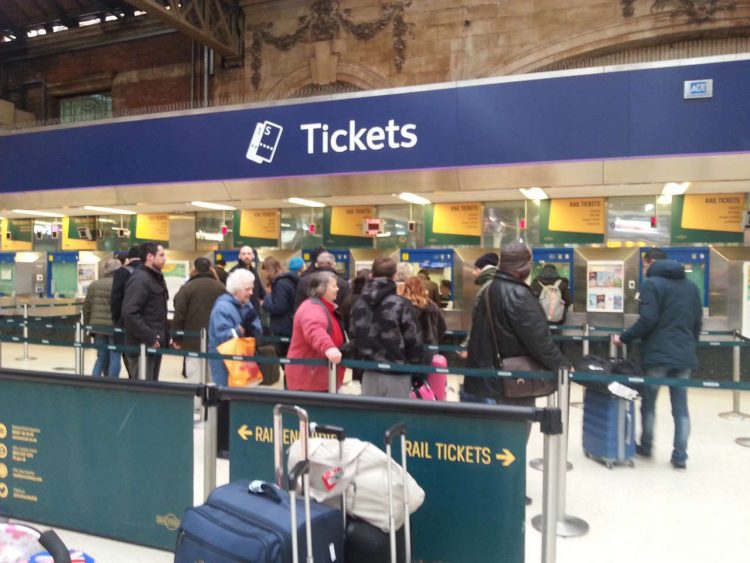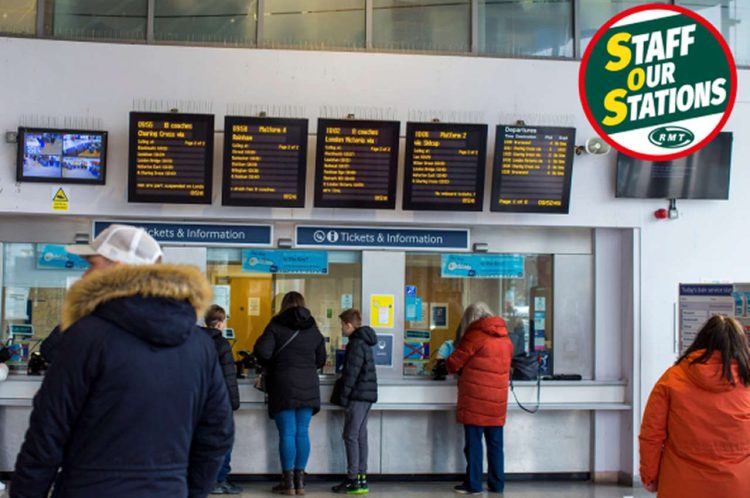Train operating companies have begun passenger consultations about a review of ticket offices.
The Rail Delivery Group is presenting the plans as moving staff from ticket offices and into stations, offering more face-to-face support, but train operating companies have not ruled out staffing cuts and redundancies.

Ticket office staff will be replaced by a multi-skilled ‘customer help’ role, which the RDG claims will be “better able to give advice about the best and cheapest fares, advise on journey planning and support customers with accessibility needs”, a service that is carried out by ticket office staff and station staff. Despite the planned closures, the RDG claims that staff will be “more visible and accessible”.
The RDG’s argument for closing ticket offices is based on changes in ticket-buying habits. In the mid-nineties, 82% of all tickets were sold at ticket offices, a figure that has fallen to an average 12% today in what the body describes as a “generational shift in customer behavior”, pointing out that other organisations, such as Transport for London and most airlines, have already closed ticket offices.
The public consultation will last for twenty-one days. It will be facilitated by independent passenger watchdogs Transport Focus and London TravelWatch, who are encouraging passengers who wish to participate to visit their website of those of their local train companies.
RDG admits that it is pressing ahead with its closure plan despite still being in dispute with the ASLEF and RMT trade unions, with RMT’s dispute including a demand for jobs to be protected. The union is campaigning against ticket office closures, and will broadcast its response this evening, with the public invited to watch the webcast via this link.

The train operators’ organisation claims that revenue is 30% below pre-pandemic levels. However, this figure refers to last year, and passenger numbers have increased significantly since then.
RDG promises to implement the ticket office closures smoothly, with changes phased in gradually.
It estimates that 99% of transactions made at ticket offices last year can be made at Ticket Vending Machines (TVMs) or online, and promises to improve and upgrade TVMs. It also promises that ticket office facilities will remain open at the busiest stations and interchanges, selling the full range of tickets while the transition takes place.
Once the changes have been fully implemented, passengers who find that the ticket they need is unavailable at their departure station will be able to buy their ticket during their journey, at a ticket office en route, or at their destination. However, RDG’s statement does not clarify that this extends to passengers who are unable to buy tickets that are available, for example due to disability-related difficulties in using TVMs.
RDG claims that affected staff will have the option of moving to a new skilled role with re-training and re-skilling. It says that train companies will “engage constructively with unions at a local level”.
After engagement with accessibility, safety and passenger groups, rail companies are unveiling a series of pledges for passengers about the proposals:
- Across the network as a whole, there will be more staff available to give face to face help to customers out in stations than there are today
- Customers will never have to travel out of their way to buy tickets
- Those with accessibility needs will always be supported
- All rail staff will be treated fairly and their new roles will be more engaging
Currently, 43% of stations do not have a ticket office, with a further 40% having ticket offices that are staffed part-time. In some cases, such as Bicester Village, the ticket office is purpose-built and supported by a passenger reception desk. In others, closed ticket office facilities have been converted into community hubs, coffee shops and cafes.
RDG claims that “The reforms will not affect train companies’ ability to provide assistance to those needing wheelchair and mobility support from staff, either on demand at the station or by booking in advance. New mobile assistance teams will be created to offer extra help where needed, including for stations which are currently unstaffed.”
Helen Rowlands, an executive council member of Greater Manchester Coalition of Disabled People (GMCDP), promised a summer of campaigning to save ticket offices. She said: “We explained to Rishi Sunak that ticket offices are a vital aspect of ensuring disabled travellers’ safety, information and access needs. … It is with deep concern that we learn this week that he has chosen to disregard our warning.”
Jacqueline Starr, Rail Delivery Group chief executive, said: “The ways our customers buy tickets has changed and it’s time for the railway to change with them. With just 12% of tickets being sold from ticket offices last year, and 99% of those transactions being available on TVMs or online, our proposals would mean more staff on hand on to give face to face help with a much wider range of support, from journey planning, to finding the right ticket and helping those with accessibility needs.
“Our commitment is that we will always treat our staff, who are hugely valued and integral to the experience our customers have on the railway, fairly, with support and extra training to move into new more engaging roles. We also understand that our customers have differing needs, which is why the industry widely sought the views of accessibility and passenger groups when creating these proposals, and will continue to through the consultation. We encourage those who wish to take part to go to their local train company website or visit Transport Focus or London Travelwatch.”





Responses
I guess that it’s the new norm of how technology is still evolving and taking over people’s lives. Be better off not travelling by train and just use alternative ways or stay at home. Sad isn’t it.
Newcastle Central Station has not had a ticket office for at least 8 years. Where it used to be is now a shop and ATM’s
There is at least 15 ticket machines on the concourse.
If I am going by train I get my ticket online and pick it up from a ticket machine.
Will the proposed ‘passenger-facing’ roaming staff be equipped with ticket sales machines to provide an actual service other than pointing to a static ticket machine? Will this country’s highly complex ticketing options, exceptions et al be calibrated to reflect the loss of being able to discuss a journey with a well-informed and, in my experience, sympathetic human being? Do we care about how many of the millions of foreign tourists will respond to being forced to decipher near incomprehensible instructions in time to catch a train in order to spend the valuable foreign exchange that comprises a significant part of our national economy?
I was once responsible for a group of railway ticket offices and at that time we worked hard to offer good service and to encourage sales. But times have dramatically changed. Many aspects of our lives have changed because of the Internet. We buy things online almost by default. We research and buy travel online by rail air and sea. Banking and retail are very different from 30 years ago. I do not see how the sale of rail tickets can remain as it was in the past, it just isn’t tenable to have staffed booking offices that are hardly used. More changes will be driven by development that we can already see. Videoconferencing fundamentally changes demand for business travel. Mobile Internet can be a key advantage for rail, adding to the ability of passengers to make good use of travel time. Electric cars will bring further shocks to travel patterns to which the industry will need to respond. I am still passionately pro-rail. But the railways must keep up with these seismic changes and emb
Do the people making these decisions ever have to buy a ticket from those machines? Do they have to miss their train because someone at the gate can’t work the app. Of course not, but they do know how to give more money away to the shareholders at our expense.
Will you be able to buy an All Line Rover ticket from a machine?
Utter disgrace what help will there be for the disabled and elderly
When I travel to visit I have to get 2 separate return tickets people of my age (80yrs) wouldn’t know how to do this at a machine
What you need to do is to get a member of the station staff to help you.
You should read tales from disabled people who have booked assistance at stations only to have it fail to appear. West Midlands Rail have said that there will be groups of staff travelling around to strategic locations which means you cannot guarantee that staff will be present. My personal experience of the Cumbrian coast is passengers boarding trains without tickets as the Northern Rail machines are completely unintelligible. My recent experience at Birmingham International was that I and several others missed trains because the ticket gates were jammed with people unable to get their phone tickets to work and the station staff were either unable or unwilling to help.
Northern Rail’s Cumbrian Coast ticket machine performance is not helped by them installing standard painted mild steel machines in the open on platforms facing the sea. They rapidly rust in the salt spray that covers them, water leaks in the rust holes and ruins the electronics. Did no-one at Northern think of this and instead get the machines made from stainless steel?
Utterly disgraceful!